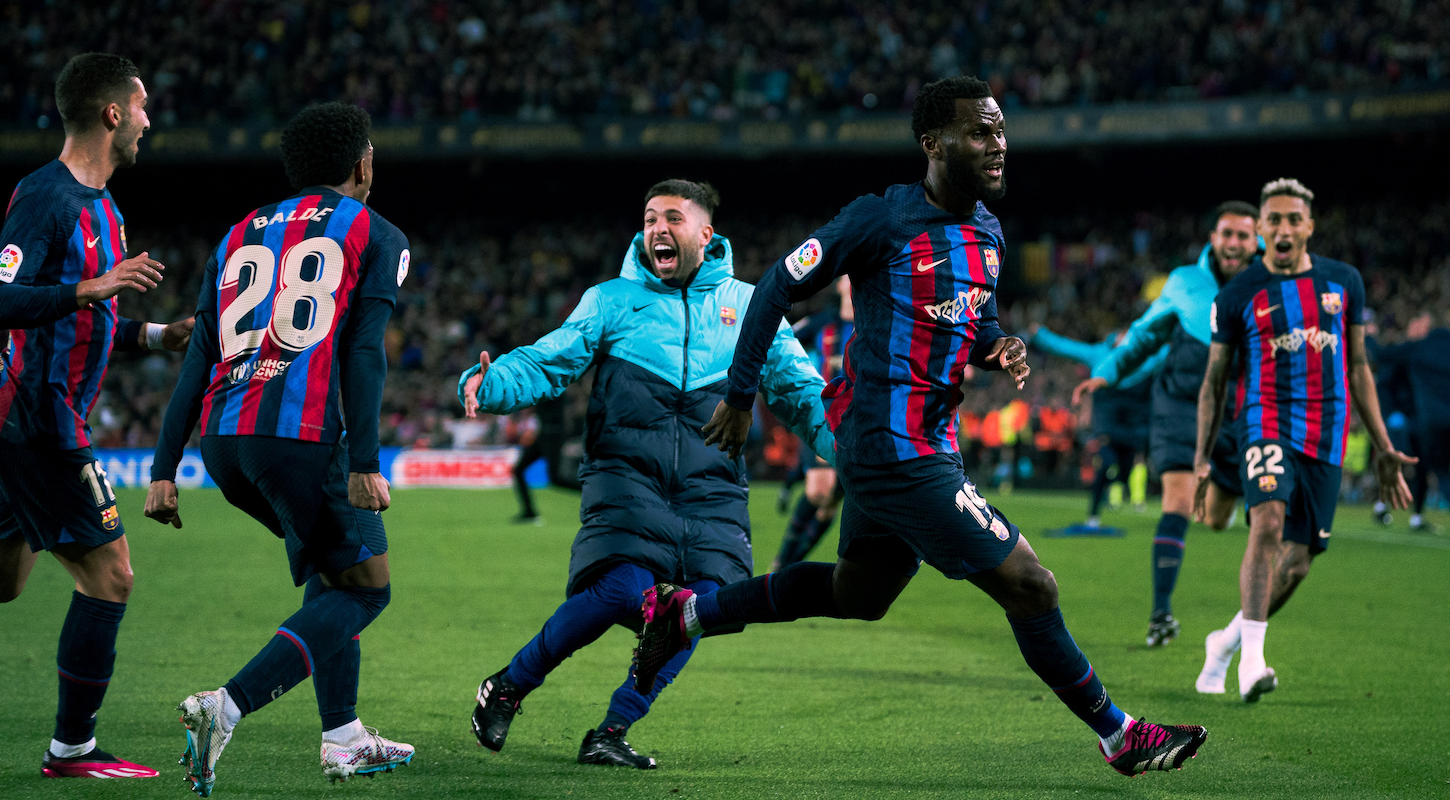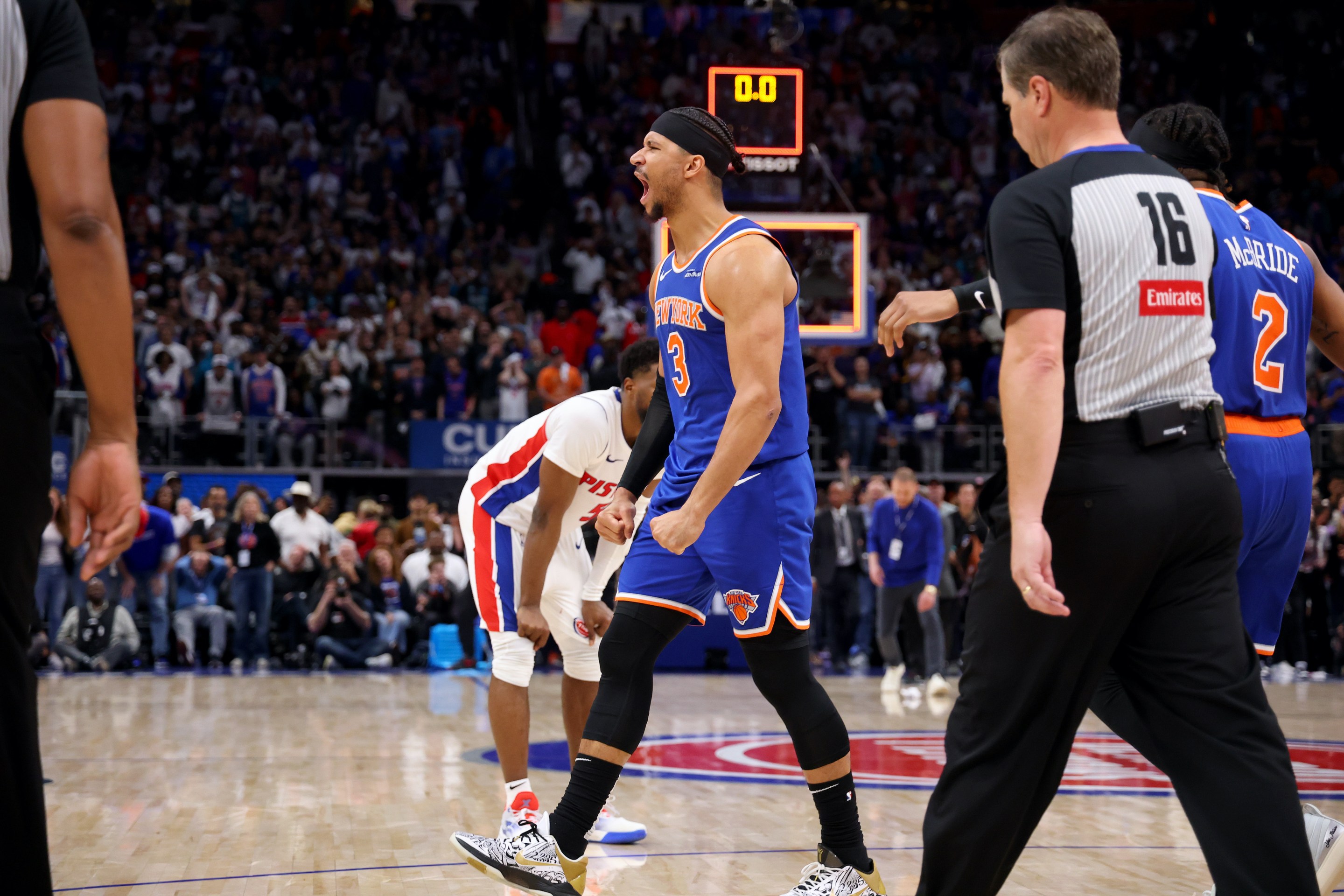Barcelona clipped Real Madrid 2-1 on Sunday in La Liga: In stoppage time after a tense 90 minutes largely controlled by the Catalans, Barça's Robert Lewandowski played a brilliant backheel pass to Alejandro Balde on the left side of Madrid's box, and Balde's cutback found a wide-open Franck Kessié in front of goal, and the Ivorian one-timed it in for the winner. The win put Barcelona 12 points clear of the field with 12 games left to play; freakish unforeseen disaster notwithstanding, this all but wrapped up the club's first league title since 2019.
There's still the Copa del Rey to settle, and Barça and Real will meet again on April 5 for the second leg of their semifinal in that competition. You can bet the domestic cup counts a great deal more to Barcelona than to its rival—who still has a Champions League title defense underway, after all—but even for Barcelona, Sunday counted as the season's climax. Mostly, what's left to do is simply to avoid some kind of total collapse. Or, well, let me clarify that: Some kind of total on-field collapse. Off-field collapse, well, that's another story.
Barcelona remains deeply, uh, troubled, that is to say. The organization is profoundly broke, for one thing: Though Barça disputes the figure, La Liga president Javier Tebas says the club will need to shave a mind-boggling €200 million off its payroll over the summer just to come into compliance with Financial Fair Play rules, to say nothing of fortifying the squad with transfers. Speaking of disputes with La Liga, there's legal wrangling underway to sort out whether Barcelona lawfully registered Spanish wonderteen Gavi's first-team contract prior to a winter deadline. If the club loses that fight, Gavi will become a free agent in the summer, an outright disaster, as the club then may be too broke to offer him a salary and also would not get any transfer bucks to take the edge off of losing one of the brightest young talents in the world.
Oh and, ha ha, right, then there is what's known as the Negreira case: Between 2001 and 2018, Barcelona apparently made some €7 million in shady-looking payments to a company run by Jose Maria Enriquez Negreira, who from 2014 to 2018 served as vice-president of Spain's refereeing committee. The club claims that these were in exchange for legitimate consultations and reports; virtually everyone else with a working brain who has been made aware of the situation figures the payments were at least intended to buy influence over Spanish referees. Spanish prosecutors have charged the club with "continued corruption in business." Even the very most exculpatory scenario is extremely hilarious, as it means Barcelona got scammed into paying millions in exchange for some bare-bones refereeing reports containing nothing that could not be pulled off of the internet by a layperson.
So maybe it's weird in light of all that to say that this has to be considered a pretty encouraging season for Barcelona. Maybe that is merely, or largely, an index of how dire the picture has looked since Leo Messi left: Well, they're exploring unplumbed depths of insolvency, in various kinds of deep shit, and probably rightly despised by pretty much every neutral observer in the world—but at least the product on the field is good.
Manager Xavi, in his first full season in charge, has transformed what was a nonsensical thrown-together Suicide Squad into something coherent, organized around its most dynamic and promising young talents, midfielders Frenkie de Jong, Pedri, and Gavi. They control games more often than not, and can break out a sudden directness against opponents who try to pin them back. Young defenders Ronald Araujo and the aforementioned Balde have blossomed into world-class players; they've combined with summer transfers Jules Koundé and Andreas Christensen to form perhaps Europe's best back four. Ousmane Dembélé enjoyed months of the best form of his heretofore doomed-seeming career (before yet another injury). That's all good.
The defense is stout, the press ferocious and unrelenting, the attack ... well, the attack largely stinks, owing at least in part to dreary conservative tactics that seem hell-bent on funneling everything out to the right touchline. And in fact Dembélé and Raphinha, who play the same position, are the only attacking players in the squad who have performed anywhere close to their career medians this season, as the players best equipped to make lemonade out of whatever they get way out there on the right edge. And Ferran Torres (who also, in his best use, plays that same position), acquired for something in the neighborhood of €60 million in the winter of 2021, now appears an all but totally sunk cost. And Ansu Fati, once the jewel of the organization and one of the world's brightest prospects, has had his confidence shattered and can't get more than a handful of minutes out of a manager who clearly doesn't trust him at all. But still!! They've scored enough to stand up a ludicrous eleven 1-0 score-lines across all competitions, which isn't nothing. In fact it is 11 just-barely-not-nothings.
I suppose if you'd told a Barça fan back in, say, the summer of 2015—when the club had just won the league, the Champions League, and the Copa del Rey—that in 2023 you'd consider a Barcelona season a success if the club won La Liga, might only send some of its former executives to prison, and has a pretty good shot at continuing to exist, they would chase you out of town with a torch. Then again, had they been paying close attention to the club's reckless spending in the transfer market, maybe they would not be surprised at all.
It is good in life to be glad for what you get, when you get anything at all. That means setting aside the future, for the moment, and the question of how much any of this will turn out to have meant in any bigger picture if compulsory salary-slashing means Barcelona starts next season with an Almería-grade roster and no hope of fighting for more than its own mere solvency. It's nice to win a league title. It feels nice. It's better to feel nice than to feel bad.






